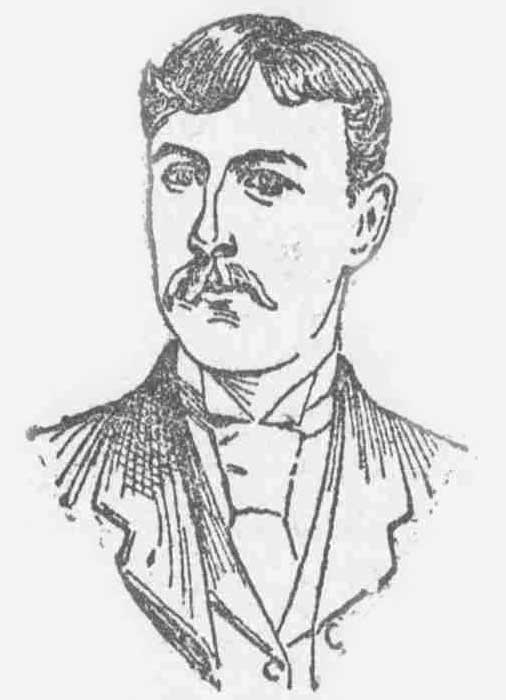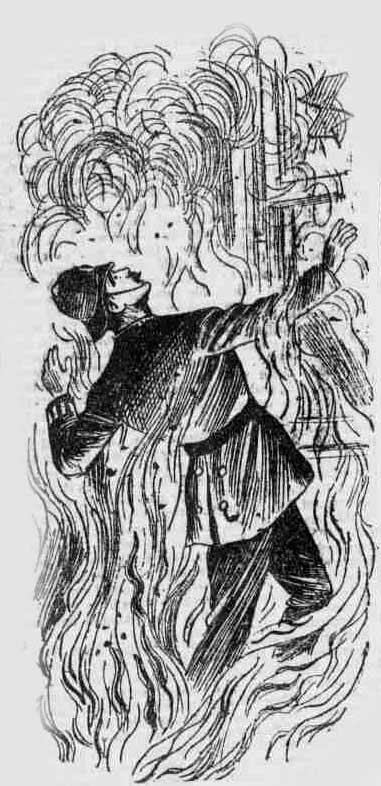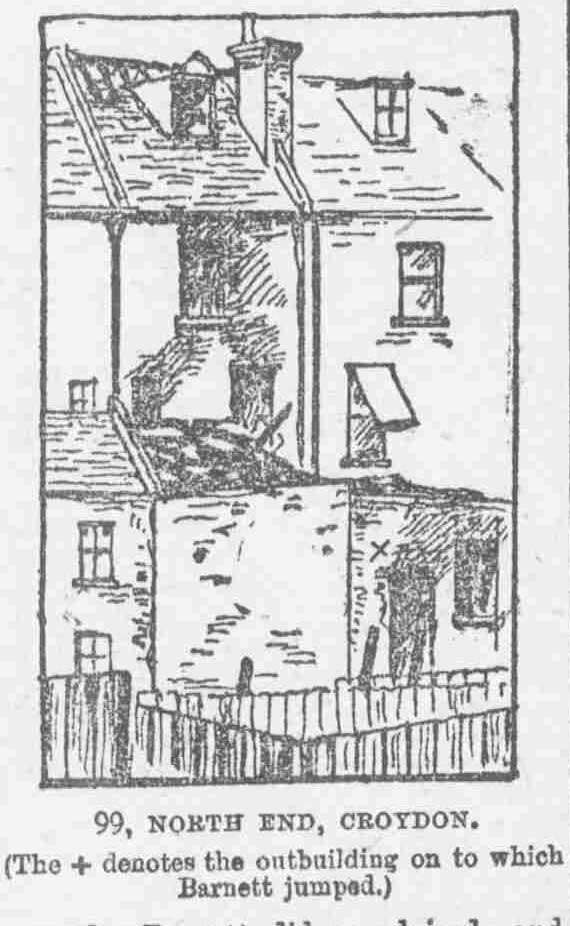
The death of Police Constable Robert Wright (1864 -1893) was rendered especially tragic in that his wife, Bessie, had only just given birth to their first child, a daughter named Ada Ellen Wright.
His plaque in Postman s Park, however, focuses on the heroism of his death, as opposed to the family tragedy that lay behind it. It reads "Robert Wright, Police Constable, Of Croydon. Entered a Burning House To Save A Woman Knowing That There Was Petroleum Stored In The Cellar - An Explosion Took Place And He Was Killed. April 30 1893."

Police Constable Robert Wright (1864 - 1893)
From Lloyd's Weekly Newspaper 7th May 1893
Copyright, The British Library Board
Under the above headline, a full account of the officer's brave actions on the night of the tragedy appeared in Lloyd's Weekly Newspaper on Sunday 7th May 1893:-
"Shortly after one on Sunday morning a fire was discovered to have broken out at 99, North-end, Croydon, a substantially-built oil and colour stores in the occupation of Mr. Henry Bennett; and, before the flames could be subdued, a police-constable unfortunately lost his life, while another was very seriously injured.
Soon after one, a strong light was seen burning in Mr. Bennet's shop, and as smoke issued from the cracks of the door it was evident that the place was on fire.
Steps were taken by the police to arouse the inmates of the adjoining premises, and meanwhile Constables Wright and Barnett had passed through the shop of Messrs. Herbert and Co., tea dealers, at 101, and so reached the roar of the burning house.
Having forced open the cellar door, the officers, with great promptitude, rolled out two barrels of paraffin, and they had scarcely done so when the cry of, "There is a woman in the house," was raised.
The policemen at once ran into the building and, ascending the staircase leading to the shop, reached the back parlour.
At this moment a cask of petroleum, which bad been left in the cellar, exploded, and the overpowering fumes caused both men to beat a hasty retreat to the window."

Police Constable Wright In The Blazing Building
From The Illustrated Police News 6th May 1893
Copyright, The British Library Board
The article in Lloyd's Weekly Newspaper recounted what happened next:-
Police-constable Purt, 259 W, who had now arrived, seeing the danger his comrades were in shouted to Barnett to jump from the window into the yard, telling him that otherwise he would be burned.
Barnett did as advised, and landed on the corrugated iron roofing or an outbuilding, and from there he fell into the arms of Police-constable Purt.
At first he was insensible, but, recovering somewhat, his first words were, "Go and save Wright".

From Lloyd's Weekly Newspaper 7th May 1893
Copyright, The British Library Board
Having done what he could to aid Barnett, Constable Purt then turned his attention to attempting to aid PC Wright.
Lloyd's Weekly News took up the story:-
"Purt now shouted out to Wright, telling him to jump for his life; but a moment or two later the unfortunate officer disappeared in the flames.
With that Purt hurried round to the front of the premises, but was unable to effect an entrance, owing to the intense heat.
By this time the Corporation fire brigade were playing on the fire from a stand pipe in North-end, and Purt told the engineer in charge that there was a policeman at the back of the shop.
Orders were then given for water to be poured into the room in which Wright was last seen, and, when the fire had been sufficiently extinguished, Inspector Lemmey, W division, accompanied by Engineer Bowers, went in search of Wright, who was discovered on the floor just in front of the window.
Wright's hands and face were much scorched, and he was apparently dead, but Mr. Gillemand, a surgeon dentist, who happened to be present, said he thought he discerned signs of breathing, so an attempt was made to administer brandy, but without avail.
Police-constable Barnett had sustained an injury to his head, and also a very severe shock to his system.
It was exactly 10 minutes to three when Wright's body was found, and it was only then that it transpired that the house had been left unoccupied on Saturday night, Mr. Bennett having left Croydon by the last train to join his wife and child at Gravesend.
According to the official report, the shop and house of 10 rooms, together with the contents, were burnt out, while the fancy repository of Mr. Remsbery, at 97, North-end, was considerably damaged by smoke and water."
The inquest into the death of Police Constable Robert Wright was held on Wednesday 3rd of May 1893.
As well as applauding the heroism and devotion to duty that had been demonstrated by Conbale's Wright and Barnett, there was some criticism regarding the behaviour of the firefighters in the aftermath of the tragedy.
Lloyd's Weekly Newspaper outlined the matters discussed in its issue of the 7thy May 1893:-
"The Croydon coroner held an inquest on Wednesday, on the body of Police-constable Wright.
In the course of the evidence Inspector Lemmey said he entered the window where the unfortunate man was last seen, and discovered his body at that very spot.
Two firemen were standing in the same room playing on two tin vessels, but they had not seen the deceased.
He had nothing to complain of in the conduct of the firemen during the progress of the fire, but he had to speak to several afterwards.
At about four o'clock he complained of some of the firemen having taken too much to drink. It was an unwritten law that, on the occasion of a fire, the police opened a public-house for the use of the firemen. The men complained of were, presumably, drunk when they came to the fire.
Inspector Goss gave corroborative evidence.
In his opinion the men were drunk.
The coroner said it was a great pity that two men belonging to the Corporation Fire brigade should be at a fire drunk.
The jury returned a verdict of "Accidental death," and expressed their admiration of the services rendered by the police.
Mr. Elbrough (town clerk) intimated that the conduct of the two firemen would receive the serious attention of the authorities.
Yesterday, upon making inquiries at the Croydon General hospital, it was ascertained that Police-constable Barnett had so much improved that he will, in all probability, be able to leave the institution next week.
Wright's widow, who had been confined only a month, is very seriously ill."